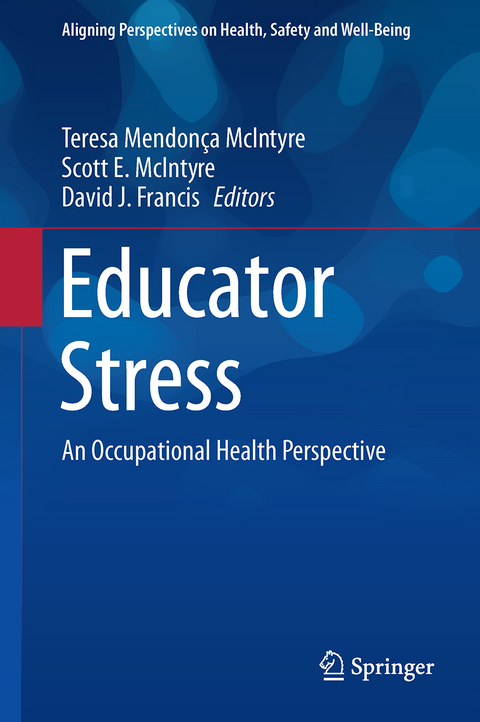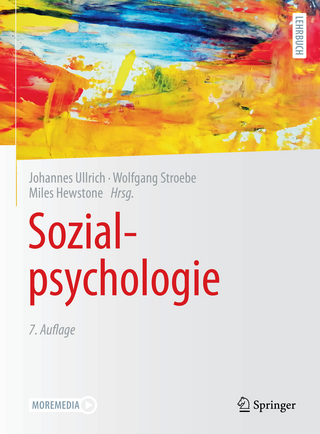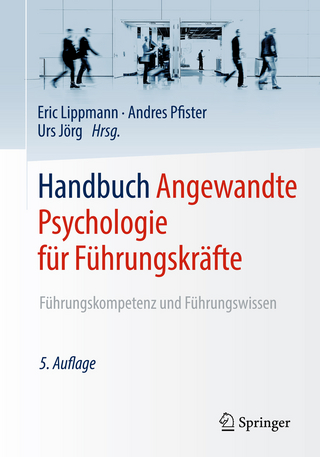
Educator Stress
Springer International Publishing (Verlag)
978-3-319-53051-2 (ISBN)
Teresa Mendonça McIntyre, M.Ed. M.A., Ph.D. FEHPS, is Dean of the College of Education and Behavioral Sciences and Professor of Psychology at Houston Baptist University, and Adjunct Professor at the Texas Institute for Measurement, Evaluation and Statistics, University of Houston, U.S.A, where she had been Research Professor. She was previously Director of the Health Psychology Doctoral/Master's programs at the University of Minho, Portugal. She has had over 20 years of experience as lead researcher in job stress, health and education, more recently as principal investigator on a U.S. Department of Education (IES) funded grant on teachers' stress, effectiveness, and student outcomes. Dr. McIntyre has been President of the European Health Psychology Society (EHPS), is Fellow of the EHPS, and Deputy Chair of its Honorary Fellows Committee. She has served on many journal editorial boards, including The European Psychologist, Health Psychology Review, Health Psychology Bulletin and the Brazilian Review of Health Promotion. Dr. McIntyre has edited and co-edited several books, and has published more than 150 chapters and articles internationally. Scott E. McIntyre, M.Ed., M.A., Ph.D. is an Associate Professor and Director of the Industrial Organizational program at the University of Houston-Clear Lake. He has a diversified experience in organizational consulting, such as with AT&T (U.S.) and International Survey Research (ISR, U.K.). In Portugal, he was a Professor of Social and Organizational Psychology at the University of Minho and at the University Institute of Maia (ISMAI) where he chaired the Psychology Department. Together with his wife, he pioneered the development of Occupational Health Psychology in Portugal and conducted research on occupational stress in at-risk professions. He has published internationally and co-edited several books, such as "Occupational Health Psychology: European perspectives on research, education and practice"(Vols. I and II). He served on the Executive Committee of the European Academy of Occupational Health Psychology and was a charter member of the Society of Occupational Health Psychology, and is ad-hoc reviewer in several organizational and occupational health journals. David J. Francis, M.A., Ph.D., is Hugh Roy and Lillie Cranz Cullen Distinguished University Chair of Quantitative Methods in the Department of Psychology, is the Director of the Texas Institute for Measurement, Evaluation, and Statistics, and Co-Director of the Center for Advanced Computing and Data Systems at the University of Houston. He is a Fellow of the Association for Psychological Science, of Division 5 of the American Psychological Association, and an Inaugural Fellow of the American Educational Research Association. He has published over 250 scientific articles and has served on the editorial boards of numerous journals in psychology and education. Dr. Francis chairs the National Research Council's Board on Testing and Assessment, is a frequent advisor to the U.S. Department of Education on statistical issues, assessment and accountability, and English Language Learners, and is internationally known for his research on validity in the identification and classification of learning disabilities.
Part I. Defining the Problem of Educator Stress in the Context of Current Education Challenges.- Chapter 1. School Context and Education System Factors Impacting Educator Stress (Rebecca J. Collie, Nancy E. Perry, and Andrew J. Martin).- Chapter 2. Current Knowledge on the Nature, Prevalence, Sources and Potential Impact of Teacher Stress (Cheryl Travers).- Chapter 3. Consequences of Job Stress for the Psychological Well-Being of Educators (Irvin S. Schonfeld, Renzo Bianchi, and Peter Luehring-Jones).- Chapter 4. Biological Pathways to Stress-Related Disease Vulnerability in Educators (Silja Bellingrath, and Brigitte M. Kudielka).- Chapter 5. Teacher Stress and Teacher Self-Efficacy: Relations and Consequences (Einar M. Skaalvik and Sidsel Skaalvik).- Chapter 6. Consequences of Educator Stress on Turnover: The Case of Charter Schools (Stephanie L. Cano, Belinda Bustos Flores, Lorena Claeys, and Daniel A. Sass).- Chapter 7. The Role of Culture and Other Contextual Factors in Educator Stress (Christopher J. McCarthy, Sally Lineback, Paul G. Fitchett, Richard G. Lambert, Maytal Eyal, and Lauren H. Boyle).- PART II. Understanding Educator Stress from an Occupational Health Framework.- Chapter 8. Development and Testing of a Theoretical-Empirical Model of Educator Stress, Coping and Burnout (Cameron Montgomery).- Chapter 9. The Job Demand-Control (-Support) Model in Teaching Context (Margot van der Doef and Chris Verhoeven).- Chapter 10. Applying General Occupational Health Theories to Educational Stress and Health: Evidence from the Effort-Reward Imbalance Model (Johannes Siegrist).- Chapter 11. Applying Occupational Health Theories to Educator Stress: Contribution of the Job-Demands-Resources Model (Toon W. Taris, Peter L. M. Leisink, and Wilmar B. Schaufeli).- Chapter 12. Towards a Dynamic and Integrative Theory of Educator Stress (Teresa M. McIntyre, Scott E. McIntyre, Cristopher D. Barr, David J. Francis, and Angelia Durand).- PART III. Managing and Reducing Stressin Education Systems.- Chapter 13. Defining Healthy Schools: An Occupational Health Psychology Perspective on Healthy School Climates (Robert Sinclair, Janelle H. Cheung, and Adam Cox).- Chapter 14. Individual-level Interventions: Mindfulness-Based Approaches to Reducing Stress and Improving Performance among Teachers (Patricia A. Jennings and Anthony A. DeMauro).- Chapter 15. Individual-organizational Interface Stress Management Interventions (Raymond Randall and Cheryl Travers).- Chapter 16 Organizational Interventions to Reduce Sources of K-12 Teachers' Occupational Stress (Paul Landsbergis, Jeanette M. Zoeckler, Bianca Rivera, Darryl Alexander, Amy Bahruth, and Wendy Hord).- Chapter 17. New Directions in Intervention: Cyber-bullying, Schools and Teachers (Tom Cox, Magda Marczak, Kevin Teoh and Juliet Hassard).- PART IV. Implications for Research, Practice and Policy in Education.- Chapter 18. Issues in Research Methodology on Educator Stress (David J. Francis, Christopher D. Barr,Julia Benoit, and Teresa M. McIntyre).- Chapter 19. Translating Education Stress Research into Practice and Policy (Peggy McCardle).- Chapter 20. Implications of an Occupational Health Perspective for Educator Stress Research, Practice, and Policy: Concluding Comments (Scott E. McIntyre, Teresa M. McIntyre, and David J. Francis).
"Educator Stress: An Occupational Health Perspective is a state of the art volume which nicely deals with the problem of educator stress ... . this ground-breaking book opens new doors to the world of research on educators' psychological, physiological, and social well-being. We hope that the knowledge presented in this volume breaks new ground for researching teachers' needs and stress in a global context and will provide an agenda for future science." (Mehdi Haseli Songhori and Behzad Ghonsooly, Psychological Studies, Vol. 63, 2018)
“Educator Stress: An Occupational Health Perspective is a state of the art volume which nicely deals with the problem of educator stress … . this ground-breaking book opens new doors to the world of research on educators’ psychological, physiological, and social well-being. We hope that the knowledge presented in this volume breaks new ground for researching teachers’ needs and stress in a global context and will provide an agenda for future science.” (Mehdi Haseli Songhori and Behzad Ghonsooly, Psychological Studies, Vol. 63, 2018)
| Erscheinungsdatum | 15.09.2017 |
|---|---|
| Reihe/Serie | Aligning Perspectives on Health, Safety and Well-Being |
| Zusatzinfo | XXIV, 511 p. 20 illus. |
| Verlagsort | Cham |
| Sprache | englisch |
| Maße | 155 x 235 mm |
| Themenwelt | Geisteswissenschaften ► Psychologie ► Arbeits- und Organisationspsychologie |
| Medizin / Pharmazie ► Medizinische Fachgebiete ► Arbeits- / Sozial- / Umweltmedizin | |
| Medizin / Pharmazie ► Medizinische Fachgebiete ► Psychiatrie / Psychotherapie | |
| Wirtschaft ► Betriebswirtschaft / Management ► Personalwesen | |
| Schlagworte | Behavioral Science and Psychology • Healthy Schools • Human Resource Management • industrial and organizational psychology • Occupational and industrial psychology • Occupational Health • occupational medicine • Occupational Medicine/Industrial Medicine • Personnel and human resources management • Psychology • teacher effectiveness • teacher retention • Teacher Stress and Burnout • Teacher Turnover |
| ISBN-10 | 3-319-53051-8 / 3319530518 |
| ISBN-13 | 978-3-319-53051-2 / 9783319530512 |
| Zustand | Neuware |
| Haben Sie eine Frage zum Produkt? |
aus dem Bereich


